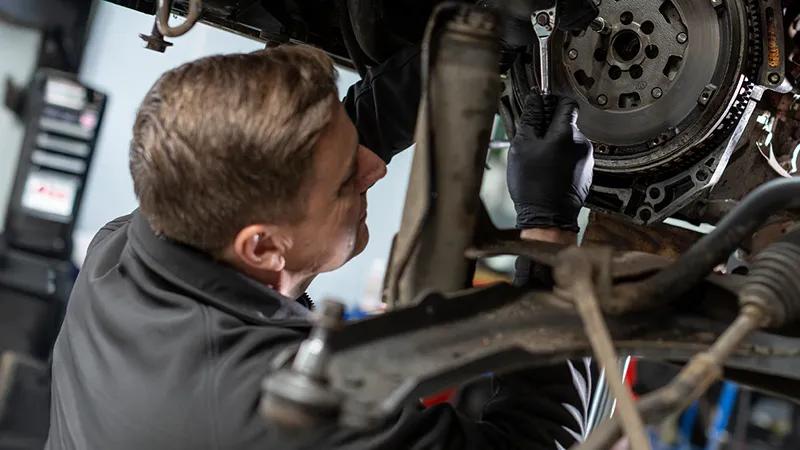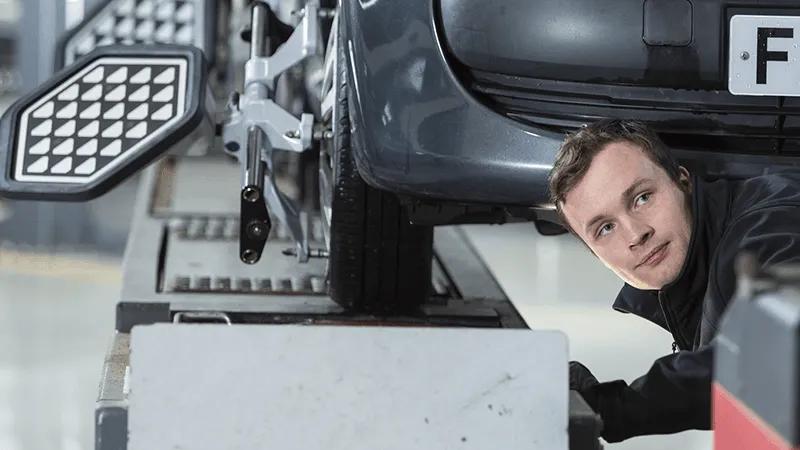
Book a clutch repair
Having trouble changing gears, or noticed a burning smell? It might be time for a clutch repair. Whether it's a worn-out clutch plate, pressure plate, or release bearing. A working clutch will ensure smooth gear transitions and improve vehicle control.

Book a diagnostic
A mechanic will check your car for faults and talk you through any repairs you might need. There are various ways to check for faults, which could include a physical examination or plugging in to check your car’s onboard engine management system.
Content Guide
Introduction
The clutch is an important mechanical component in most vehicles, serving as the crucial link between the engine and its transmission system. By allowing the driver to smoothly engage and disengage power, the clutch enables seamless gear changes, controlled acceleration, and effective manoeuvring.
Essentially, if you want to keep driving, a properly functioning clutch is a must!
How does a clutch work?
How a car’s clutch works is fascinating. When you press the pedal, the engine disconnects from the wheels, allowing for gear changes without damage. Releasing the pedal then reconnects the engine to the wheels, restoring power flow. Friction is key here. The clutch uses a friction plate against the engine's flywheel to engage or disengage the transmission, ensuring smooth gear changes and gearbox preservation. In city driving, where there's frequent starting, stopping, and gear shifting, the clutch is constantly in action, making it an essential component for seamless gear transitions and a smooth driving experience.
However, wear and tear over time are inevitable due to its integral role. Recognising signs of a worn clutch early can prevent a situation where you’re stuck on the hard shoulder waiting for help. At the RAC, we're here to help you understand your vehicle better and provide expert advice and service to keep your car running smoothly.
What are the signs of a failing clutch?
Concerned about your clutch? Look out for these signs early on to save time and hassle later:
- Difficulty changing gears: If you're finding it hard to shift gears, something is not right with your clutch.
- Burning smell: A noticeable odour, similar to burning rubber, can be a symptom of a clutch that's overheating and wearing out prematurely. Watch out for smoke too!
- Strange noises: Listen out for any unusual noises when you press down on the clutch pedal. A squeaking or grumbling sound could indicate a problem with the clutch mechanism.
- Slipping clutch: Clutch slippage happens when the disc fails to maintain engine power before transmission. This is shown when engine revs rise without acceleration.
- Sticky clutch pedal: If your clutch pedal feels too soft or hard when pressed it there’s likely an issue with the clutch cable or hydraulic system.
Don’t ignore any of these signs! A failing clutch impacts your car's performance, fuel efficiency, and can make your car unsafe to drive. We recommend getting any clutch issues checked out by our RAC Approved Garage network sooner rather than later.
Does my clutch need repairing or replacing?
It's a question many drivers ask themselves: does my clutch need a quick fix or a full replacement? To save both time and money, here are some key points to help you determine the best course of action:
- Clutch repair: A sticky clutch pedal or difficulty changing gears.
- Clutch replacement: A slipping clutch or a burning smell.
How much does a clutch repair cost?
A clutch repair typically costs £450-£650 depending on your car and includes replacing the clutch disc, pressure plate, and release bearing. Depending on your vehicle, it might also involve replacing the flywheel or adjusting the clutch cable or hydraulic system.
How much will a clutch replacement cost?
Replacing the clutch may require an investment, but it's essential for both your car's safety - and your own! It's crucial however to obtain an accurate estimate beforehand, as costs can vary significantly. These costs are based on several key factors:
- Car model and manufacturer: Cars require varying parts, some more expensive than others.
- Type of clutch: Standard clutches tend to be less expensive than those of high-performance vehicles.
- Labour costs: Clutch replacement timing impacts costs, with rates varying due to the skilled expertise required.
Also, additional repairs may be needed once your mechanic gets a good look at your clutch. This can add to the total cost, but don’t worry - you'll be kept informed at every junction.
At RAC, we believe in clear, transparent pricing. Get a detailed clutch replacement quote upfront with no nasty surprises!
How long does a clutch replacement take?
A clutch replacement is a bit of a bigger job than a repair, taking anywhere from 5 to 8 hours. The exact time can vary based on your car's manufacturer and model, and how easily accessible the clutch is to the mechanics.
At the RAC, we know your time is precious. That's why we aim to make the process as smooth and hassle-free as possible. We'll keep you updated on progress and get you back behind steering wheel, driving to where you need to be, safely and swiftly.
Just remember, investing in a proper replacement can often save you both time and trouble in the long run.
How long does a clutch last?
The life of a clutch can vary, but it typically lasts between 50,000 and 100,000 miles. How long yours will last depends on your driving style and conditions.
A careful driver who focuses on smooth acceleration and gentle braking can expect a longer clutch lifespan when compared to a city driver who frequently encounters stop-start situations which can accelerate wear and tear. Good driving habits combined with regular checks by your friendly MOT professional to catch issues early, will extend the life of your clutch.
Remember though, if you suspect an issue, it's always best to get it checked by a professional.
Tips for extending your clutch's lifespan:
Here are some tips on how to look after your clutch to save you money, hassle, and complaints from your grumpy children about having to take the bus to school.
- Take it easy at the start: Gentle starts from a stop use less clutch material than fast ones. Try to avoid revving the engine or sudden movements.
- Shift smoothly: Make sure you're fully pressing the clutch pedal when you shift gears. Rough shifting can lead to more wear and tear.
- Avoid resting your foot on the pedal: Even light pressure can cause the clutch to engage slightly, leading to unnecessary wear. Always keep your foot off the pedal when you're not shifting.
- Use neutral at stops: If you're waiting at traffic lights or in traffic, shift to neutral and release the clutch. It gives your clutch a break from being engaged.
- Regular checks: During your car's MOT or service, ask about your clutch. Catching issues early can prevent bigger problems down the line.
Frequently Asked Questions on clutch repairs and replacement
The price of a new clutch depends on your car's manufacturer, model, and the type of clutch it needs. We understand cost is important to you, so we'll always provide a transparent quote upfront.
Look out for these signs:
- Trouble shifting gears.
- A slipping clutch (revs increase but speed doesn't).
- A pedal that sticks, vibrates, or feels spongy.
- Strange noises when pressing the clutch.
Experiencing any of these? It might be time for a check-up.
It's best not to. A faulty clutch can lead to further damage and might even be unsafe. If you're noticing issues, get in touch with us to sort it out sooner rather than later.
Booking is easy, just visit our website. We'll need to know a bit about your car to give you an accurate quote. Once you're happy, we'll find a time that suits you to get the work done.
Yes, all our clutch repairs have a warranty to cover parts and labour. We'll give you all the details, including the duration and terms when you book your repair.
Most clutch repairs take between 5 to 8 hours, depending on your car's specifics. We'll let you know how long we expect the work to take when you book your repair.
Yes, here are a few tips:
- Avoid riding the clutch.
- Shift gears smoothly.
- Don't use the clutch to hold the car on a hill.
- Keep your foot off the clutch unless you're shifting.
Good habits can significantly extend your clutch's lifespan.
A clutch repair typically includes replacing the clutch disc, pressure plate, and release bearing. Depending on your car, it might also involve replacing the flywheel or adjusting the clutch cable or hydraulic system.
Several factors affect the cost, including the type of clutch your car needs and the complexity of the replacement work. Some cars require more labour to access and replace the clutch, which can increase the cost.
If we spot anything else during the clutch repair, we'll let you know right away. We provide a full transparent quote for any additional recommended work and will only proceed with your approval. We're here to answer any more questions you might have and ensure your clutch repair goes as smoothly as possible and you’re back on the road in no time.
Filter by


